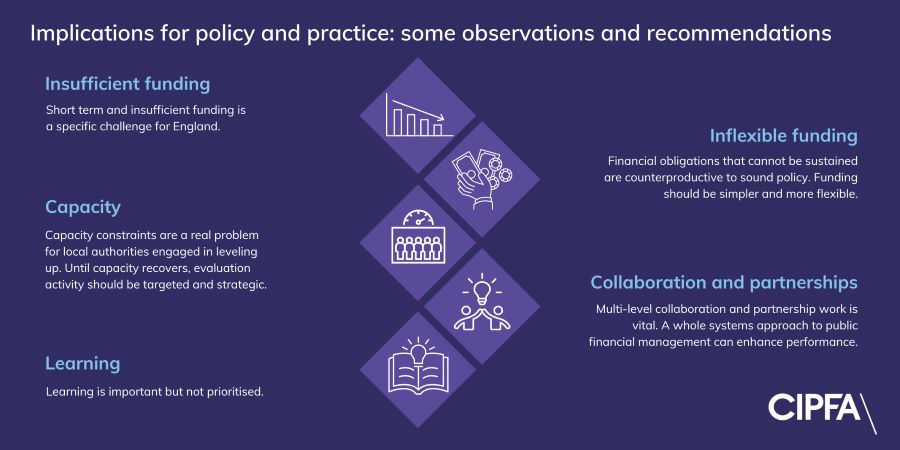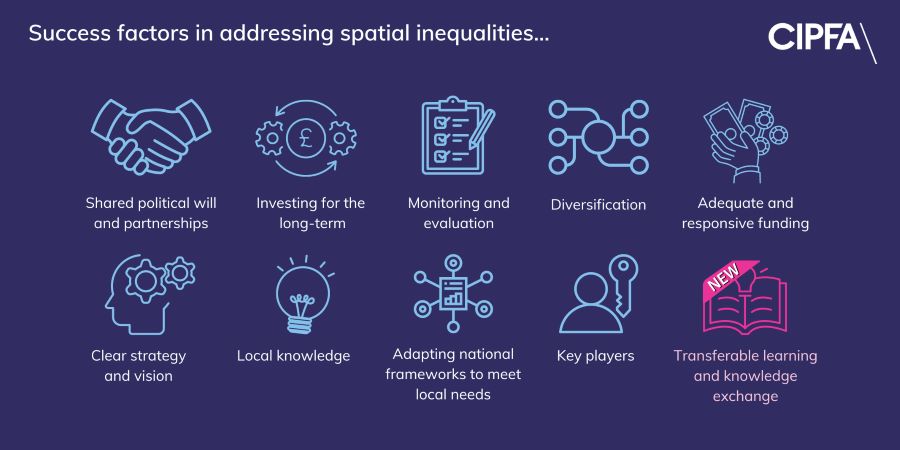
Investing in regional equality – four English examples
"Unfortunately, there is no simple or quick fix to resolve some of the world's most pressing issues – like eradicating poverty, tackling climate change or improving access to healthcare and education. But we should still try."
Rob Whiteman, CIPFA Chief Executive
Download Investing in regional equality: four English examples
Some international cities have innovated to successfully overcome significant social and economic inequalities in recent years. CIPFA, in partnership with the University of Birmingham City-REDI, has sought to understand whether English local authorities could emulate this success.
Using the nine key success factors identified in CIPFA’s 2022 report, "Investing in regional equality: lessons from four cities", we examined the experiences of four different areas in England: Dudley, Enfield, South Yorkshire and Tees Valley. We wanted to know which of the nine success factors were applicable in the English context, whether they were being used to their full potential and what barriers local authorities were facing.
All nine success factors identified from international experience are in evidence in England. We found examples of innovative practice across all four areas. We also identified a tenth success factor that appears to be important in England: Transferable learning and knowledge exchange.
Despite these good examples, implementation of some success factors has been more challenging in England than in the international city-regions explored in CIPFA’s previous work. In particular, local areas have struggled to invest for the long term and to conduct effective monitoring and evaluation.

Key highlights
- Reducing inequality is complex and there is no one simple fix; it requires a long-term, multi-faceted approach, with significant levels of funding to be most successful.
- Learnings from international examples identifies success factors that can accelerate levelling up in the UK. However, implementing some success factors in England has been more challenging than in the international city-regions explored in CIPFA’s previous work. This report finds that local areas generally struggle to invest for the long term and to conduct effective monitoring and evaluation.
- Within the four English areas studied, the nine success factors identified in CIPFA’s 2022 report were recognised. An additional tenth success factor of transferable learning and knowledge exchange was identified as important in England.
- Investment should be proportionate to a region’s specific tasks and responsibilities. Single pot funding would offer local authorities greater flexibility to respond to local priorities than multiple smaller funds with prescribed uses.
- A clear vision and well-defined strategy for what the place should look like and how it should feel to live in are essential for successfully reducing inequality.
- Political will, commitment and support across geographical scales is vital in making change happen.
- Public sector institutions and finance professionals have a key role to play in measuring outcomes, ensuring value for money and building effective relationships with other national organisations.

Investing in regional equality panel discussion
The team, along with their regional collaborators, discussed the report in a webinar on 26 February 2024. Participants in the discussion included
- Jeffrey Matsu, Chief Economist, CIPFA
- Jonathon Skinner, West Midlands Combined Authority
- Paul Johnson, South Yorkshire Mayoral Combined Authority
- Sarah Murray, Local London
- Abigail Taylor, Research Fellow, University of Birmingham City, REDI
Contact us
For more information, contact the CIPFA press office, or Jeffrey Matsu, the report's co-author: jeffrey.matsu@cipfa.org
Micro Modules
Our micro modules are free of charge and offer quick introductions to selected topics. Prepared by CIPFA’s subject matter experts, they deliver key information in an easily digestible, online format.
View our micro modules on:
For the full list of our available micro modules, visit www.cipfa.org/training/micro-modules
